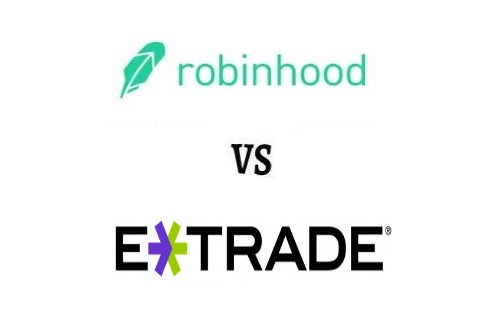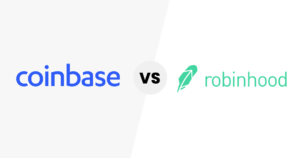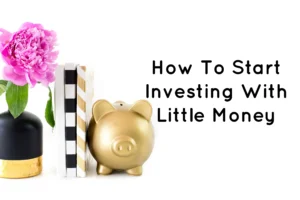When it comes to comparing E*TRADE vs. Robinhood, the decision of which stock trading app to use in 2024 can be challenging. Both platforms have unique features, competitive pricing, and robust tools that cater to different types of investors. Whether you’re a beginner looking for an intuitive interface or an experienced trader seeking advanced analytical tools, understanding the strengths and weaknesses of each app will help you make an informed choice. In this article, we will dive deep into the key aspects of E*TRADE and Robinhood, including their fees, user experience, available tools, and overall performance.
Quick Comparison
For those who want a quick verdict in the E*TRADE vs. Robinhood debate here it is: E*TRADE stands out for its comprehensive range of investment options, advanced trading tools, and extensive research resources, making it ideal for more experienced investors. On the other hand, Robinhood is the go-to app for beginners and casual traders due to its user-friendly interface, commission-free trades, and innovative features like cryptocurrency trading. Ultimately, your choice will depend on your trading experience and specific investment needs.
Features
When comparing the features of E*TRADE vs. Robinhood in 2024, both platforms offer distinct advantages tailored to different types of investors. E*TRADE provides a comprehensive suite of investment options, including stocks, bonds, ETFs, mutual funds, options, and futures. Its powerful trading tools, like the Power E*TRADE platform, cater to advanced traders with in-depth market analysis, customizable charting, and risk management tools. Additionally, E*TRADE offers extensive educational resources and market research to help investors make informed decisions.
Robinhood, on the other hand, is designed with simplicity and accessibility in mind. It features commission-free trading for stocks, options, ETFs, and cryptocurrencies, appealing to cost-conscious investors. Robinhood’s sleek and intuitive mobile app makes it easy for beginners to start trading, while its unique features like fractional shares and recurring investments provide flexibility. However, Robinhood lacks some of the advanced tools and research resources that E*TRADE offers, making it more suitable for casual traders and those new to investing.
Pros & Cons
E*TRADE
Pros:
– Comprehensive range of investment options including stocks, bonds, ETFs, mutual funds, options, and futures.
– Advanced trading tools and platforms, such as Power E*TRADE, catering to experienced traders.
– Extensive market research and educational resources from third-party providers.
– Robust customer support and multiple platform options (desktop, web, mobile).
Cons:
– Options trades incur a fee per contract, which may add up for active traders.
– More complex interface and tools can be overwhelming for beginners.
– Higher cost for futures trading compared to some competitors.
Robinhood
Pros:
– Commission-free trading for stocks, options, ETFs, and cryptocurrencies.
– User-friendly and intuitive mobile app, ideal for beginners.
– Features like fractional shares and recurring investments provide flexibility.
– Simplified, clean interface that makes trading accessible.
Cons:
– Limited research and educational resources compared to E*TRADE.
– Basic tools and charting capabilities may not meet the needs of advanced traders.
– Past issues with platform outages, which could be concerning for frequent traders.
– Monthly fee for Robinhood Gold to access additional features.
Fees
One of the most important factors to consider when choosing a trading app is the cost. E*TRADE charges $0 for stock and ETF trades, but options trades come with a $0.65 per contract fee, which can be reduced to $0.50 if you trade more than 30 times per quarter. E*TRADE also offers a range of no-transaction-fee mutual funds and has competitive rates for futures trading.
Robinhood, on the other hand, is known for its zero-commission trading on stocks, options, ETFs, and cryptocurrencies, making it highly attractive to cost-sensitive investors. However, it does charge a $5 monthly fee for its premium service, Robinhood Gold, which provides access to research reports, margin trading, and larger instant deposits.
User Experience
User experience can make or break your trading journey. E*TRADE offers a robust desktop platform, a web platform, and a highly rated mobile app. Its platforms are equipped with powerful tools, extensive research, and educational resources, providing a seamless experience for both novice and experienced traders.
Robinhood’s claim to fame is its streamlined, easy-to-use mobile app. The app’s clean design and straightforward navigation make it ideal for beginners. While Robinhood also offers a web platform, its mobile app remains the centerpiece, prioritizing simplicity and quick access to trades.
Available Tools
E*TRADE’s tools are among the best in the industry. The Power E*TRADE platform offers advanced charting, technical analysis, strategy scanners, and backtesting capabilities. E*TRADE also provides extensive market research from third-party providers like Morningstar and Thomson Reuters.
Robinhood’s tools are more basic but sufficient for the average investor. The app provides real-time market data, customizable watchlists, and limited charting capabilities. Robinhood Gold members also gain access to Morningstar research reports, but the overall depth and breadth of tools are less comprehensive than what E*TRADE offers.
Performance
In terms of performance, both apps are reliable and efficient, ensuring quick order execution and stable platform operation. E*TRADE’s multiple platforms are designed to handle high-volume trading with minimal latency, making it suitable for active traders. Robinhood, while generally reliable, has faced some high-profile outages in the past, which may be a concern for those who trade frequently or in large volumes.
Conclusion
Choosing between E*TRADE and Robinhood depends largely on your trading experience and specific needs. If you are a beginner or a cost-conscious investor looking for simplicity and ease of use, Robinhood is an excellent choice. However, if you require advanced tools, extensive research, and a wide range of investment options, E*TRADE is the better option. Both platforms have their unique strengths, so consider what features are most important to you before making a decision.



